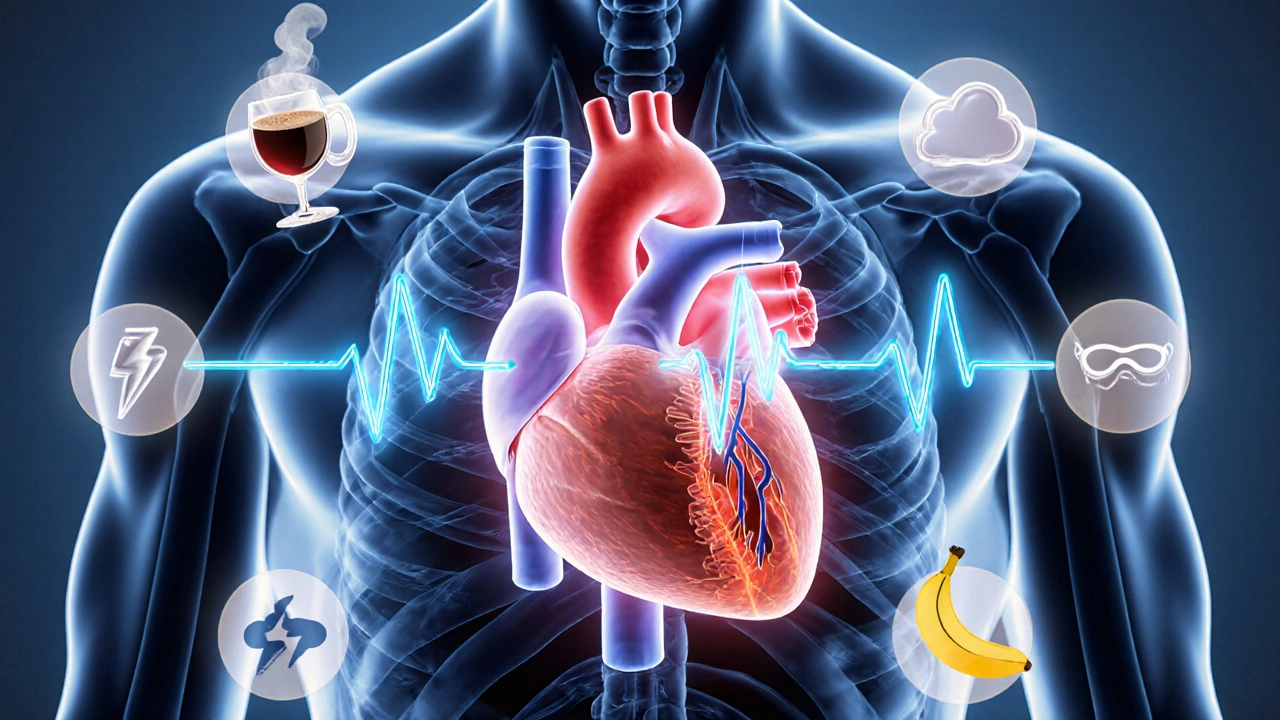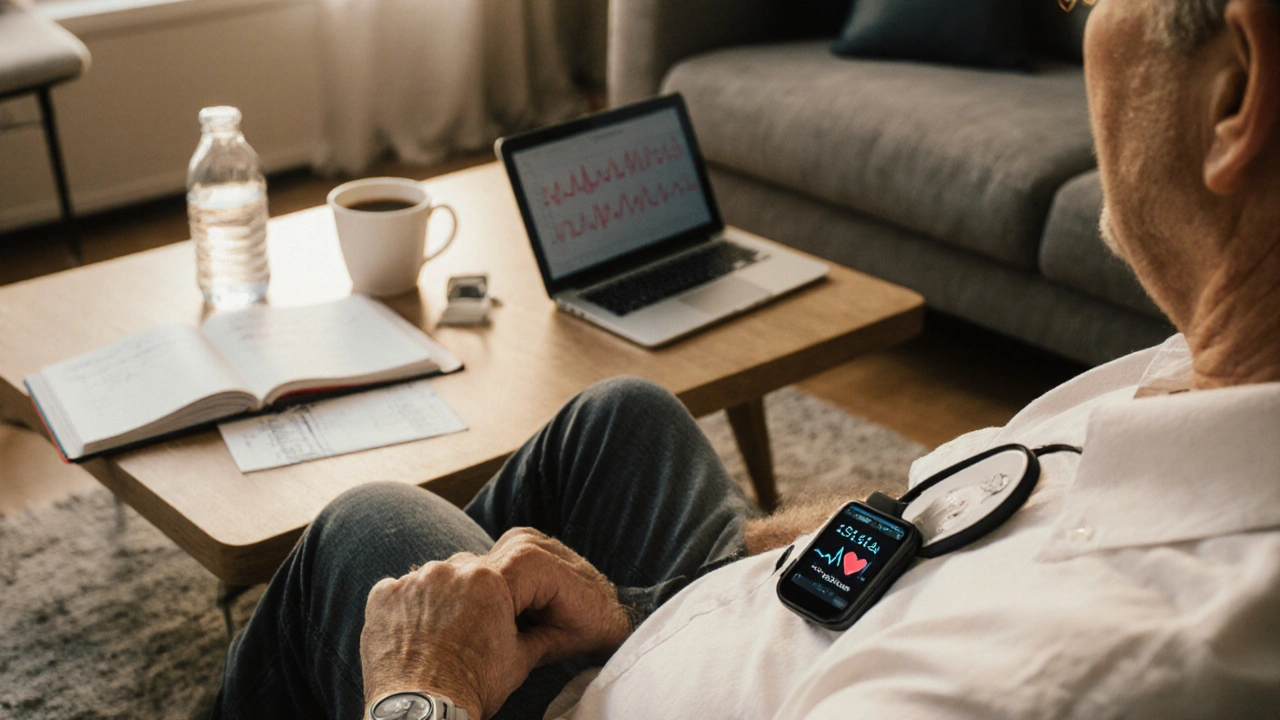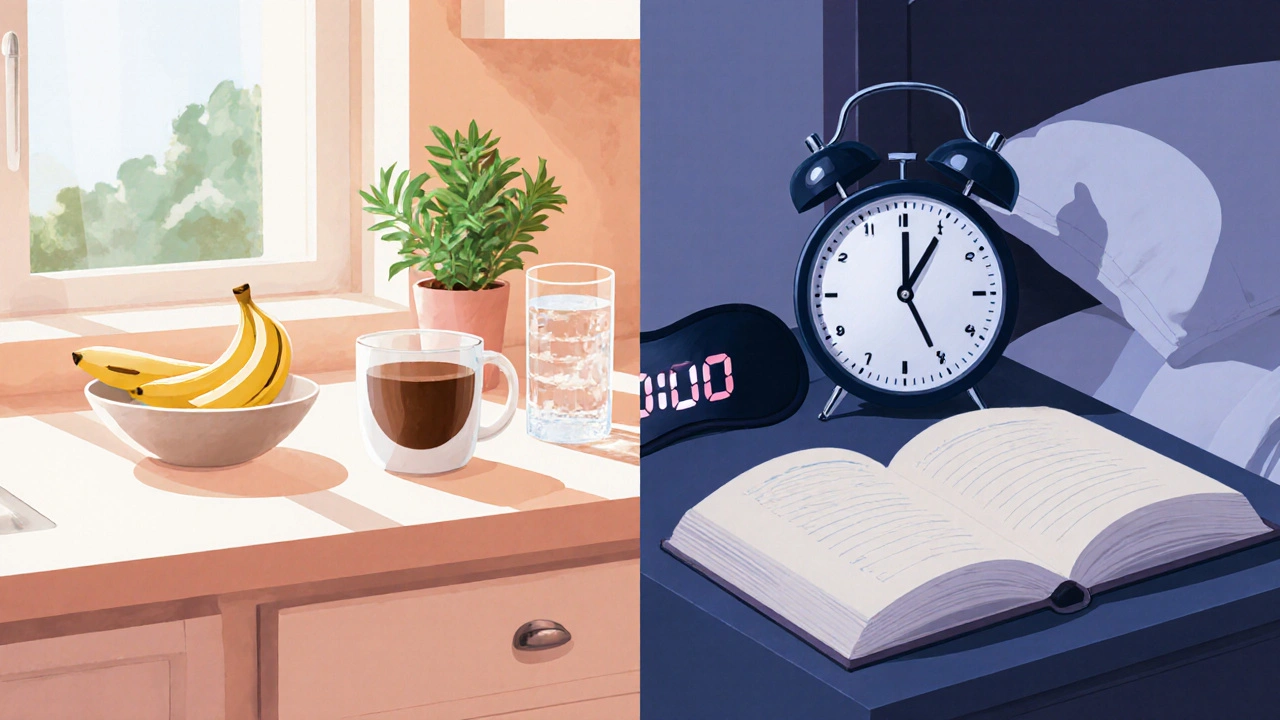Heart Rhythm Disorder Triggers: Prevention Tips & Lifestyle Guide
 Oct, 12 2025
Oct, 12 2025
Arrhythmia Trigger Tracker
Track Your Symptoms & Potential Triggers
Log your heart rhythm episodes and potential triggers to identify patterns. Your data will help you understand which habits affect your heart rhythm.
Your Trigger Patterns
Log your first symptom episode to see patterns emerge.
Key Takeaways
- Identify the most common triggers-caffeine, alcohol, stress, sleep problems, and electrolyte swings.
- Track symptoms with a simple diary or a wearable monitor.
- Make practical lifestyle tweaks: limit stimulants, manage stress, improve sleep hygiene, and keep electrolytes balanced.
- Know when to call a doctor-rapid heartbeat, fainting, or chest pain.
- Regular check‑ups with a cardiologist keep you ahead of trouble.
When you hear the term Heart Rhythm Disorder is a condition where the electrical signals that control the heartbeat become irregular, too fast, or too slow, the first thought might be a serious medical emergency. In reality, many people live with a mild form that can be managed by spotting and avoiding everyday triggers. This guide walks you through what the disorder is, which habits tend to set it off, and how to keep those triggers at bay without giving up the things you love.
What Exactly Is a Heart Rhythm Disorder?
Broadly, a Heart Rhythm Disorder (also called an arrhythmia) is any deviation from the heart’s normal pacing. The most frequent types include:
- Atrial Fibrillation is a fast, irregular rhythm that begins in the upper chambers (atria), affecting millions worldwide.
- Ventricular Tachycardia is a rapid heartbeat that starts in the lower chambers (ventricles), which can be life‑threatening if not treated.
- Bradycardia is an unusually slow heart rate, often below 60 beats per minute.
These conditions share a common thread: the heart’s electrical system is sensitive to external and internal cues. Understanding those cues is the first step toward prevention.
Common Triggers That Can Set Off an Arrhythmia
Everyone’s body reacts differently, but research and real‑world monitoring point to a handful of repeat offenders. Below is a quick rundown.
- Caffeine is a stimulant found in coffee, tea, energy drinks, and chocolate. Even moderate doses can increase heart rate by 5‑10% in sensitive individuals.
- Alcohol is a depressant that, paradoxically, can cause “holiday heart” episodes of irregular rhythm after binge drinking.
- Stress is the body’s fight‑or‑flight response, releasing adrenaline that can speed up the heartbeat.
- Sleep Apnea is a condition where breathing stops briefly during sleep, causing oxygen dips that trigger arrhythmias.
- Electrolyte Imbalance is low potassium or magnesium levels that disturb the heart’s electrical conduction.
- Certain Medications is beta‑agonists, decongestants, and some anti‑arrhythmic drugs that can paradoxically provoke irregular beats.
- Extreme Exercise is high‑intensity workouts that push heart rate beyond 85% of max for prolonged periods.
- Dehydration is reduced blood volume that makes the heart work harder, sometimes causing premature beats.
- Smoking is exposure to nicotine and carbon monoxide, both of which can irritate cardiac tissue.
Knowing which of these are most relevant to you is a matter of observation and, sometimes, a little medical help.

How to Pinpoint Your Personal Triggers
Self‑tracking works better when you have objective data. Two tools are especially handy.
- Holter Monitor is a portable ECG device worn for 24‑48hours that records heart rhythm continuously. Review the report with your cardiologist to see patterns linked to meals, caffeine spikes, or nighttime breathing pauses.
- Smart Wearable is a fitness tracker that offers real‑time heart‑rate alerts and can export data for deeper analysis. While less precise than a Holter, it’s great for day‑to‑day insight.
In addition to devices, keep a simple symptom diary. Note the time, activity, food or drink, stress level (1‑10), and any palpitations. After a week, patterns usually surface.
Practical Strategies to Avoid the Most Common Triggers
Below are evidence‑based steps you can integrate without overhauling your whole lifestyle.
- Moderate caffeine. Aim for no more than 200mg per day (about one 12‑oz coffee). If you’re highly sensitive, consider switching to decaf after 2p.m.
- Limit alcohol. Keep drinks to one standard serving on weekdays and no more than two on weekends. Pair each drink with food to blunt spikes.
- Stress‑management toolbox. Try 5‑minute breathing exercises, progressive muscle relaxation, or a short walk during high‑pressure moments. Consistency beats intensity.
- Sleep hygiene. Target 7‑9hours of uninterrupted sleep. Keep the bedroom cool, dim, and screen‑free. If you snore loudly or wake gasping, get screened for sleep apnea.
- Electrolyte balance. Incorporate potassium‑rich foods (bananas, avocados, sweet potatoes) and magnesium sources (nuts, leafy greens). In hot climates, a low‑sugar sports drink can replenish losses.
- Medication review. Bring every prescription and over‑the‑counter drug to your cardiologist. Some decongestants and weight‑loss pills are hidden arrhythmia triggers.
- Exercise wisely. Follow the 10‑minute rule: if a workout pushes you past 85% of your max heart rate for more than 10minutes, include a cool‑down period and monitor for extra beats.
- Stay hydrated. Aim for at least 2L of water daily, more if you sweat heavily.
- Quit smoking. Even a few cigarettes a day can increase arrhythmia risk. Seek nicotine replacement or counseling if needed.
These adjustments are simple enough to test one at a time. If you notice fewer palpitations after cutting back on coffee, you’ve likely found a personal trigger.
Comparison of Major Triggers
| Trigger | Typical Effect Level | Usual Dose/Exposure | Best Mitigation |
|---|---|---|---|
| Caffeine | Moderate (5‑10% HR increase) | 200mg (≈1 cup coffee) | Limit to ≤200mg; avoid after 2p.m. |
| Alcohol | High (binge → “holiday heart”) | 2‑3 drinks in 2h | Drink with food; cap at 1‑2 drinks/weekend |
| Stress | Variable (depends on adrenal surge) | Acute spikes during work/life events | Breathing drills; regular breaks; therapy |
| Sleep Apnea | High (oxygen dips trigger ectopy) | Episodes >30sec/night | CPAP therapy; weight management; sleep study |
| Electrolyte Low | Moderate‑High (potassium <3.5mmol/L) | Inadequate dietary intake or excess sweat | Balanced diet; rehydration with electrolytes |

When to Call a Doctor Immediately
If you experience any of the following, treat it like an emergency:
- Sudden heart rate >180bpm at rest.
- Chest pain, pressure, or shortness of breath.
- Fainting or near‑fainting spells.
- Palpitations lasting more than 30seconds without a clear trigger.
Even if you’ve never had a serious episode, a routine cardiologist visit can set up baseline testing and discuss long‑term management plans.
Next Steps for a Safer Heart Rhythm
1. Start a symptom diary. Track meals, drinks, stress, and any fluttering feelings.
2. Schedule a Holter monitor. Bring the report to your cardiologist for interpretation.
3. Pick one lifestyle tweak. Cut caffeine by half for two weeks and note any change.
4. Review medications. Ask your doctor if any prescription could be contributing.
5. Stay informed. Re‑read trusted sources (e.g., national heart societies) every few months to keep up with new guidelines.
Frequently Asked Questions
Can occasional caffeine still cause arrhythmia?
Yes. Even a single large coffee can raise heart rate enough to provoke premature beats in people who are caffeine‑sensitive. The key is to monitor your own response and stay below the 200mg daily threshold if you notice symptoms.
Is alcohol‑induced “holiday heart” permanent?
Usually not. The irregular rhythm often resolves within a few days of abstaining. However, repeated binge drinking can lead to lasting atrial remodeling, so moderation is important.
How does sleep apnea trigger arrhythmia?
During apnea episodes, oxygen levels drop and carbon dioxide rises, causing the autonomic nervous system to fire bursts of adrenaline. Those surges can spark premature atrial or ventricular beats.
Should I stop all exercise if I have an arrhythmia?
No. Regular, moderate‑intensity exercise often improves heart health and reduces episodes. The rule of thumb is to stay below 85% of your max heart rate and to include a proper cool‑down.
Can over‑the‑counter meds like antihistamines cause arrhythmia?
Some do. First‑generation antihistamines have anticholinergic effects that can raise heart rate. Always read labels and discuss with your doctor if you take them regularly.

John Barton
October 12, 2025 AT 02:42Oh great, another post telling us caffeine is the devil in disguise, because apparently our bodies can't handle a little beans. If the only thing keeping my heart from partying like a club DJ is a cup of coffee, maybe I should just switch to decaf and become a zombie. The dramatic warning about 200 mg feels like a police siren for people who love their morning brew. Sure, stress and sleep matter, but let's not pretend a latte is the sole culprit for every flutter. In the end, it's all about personal observation, not blanket bans.
Achint Patel
October 28, 2025 AT 01:42The heart, in its perpetual quest for rhythm, mirrors the ancient seeker searching for balance amid worldly distractions. When we sip caffeine or raise a glass, we are not merely ingesting chemicals; we are engaging in a ritual that tests the elasticity of our inner tempo. Thus, the act of logging each episode becomes a meditation, a quiet dialogue between flesh and consciousness. By charting these moments, we illuminate the subtle interplay of habit and the body's silent counsel. In this way, the tracker is less a device and more a modern-day sage.
Lilly Merrill
November 13, 2025 AT 01:42Thanks for the thorough guide, really helpful!
Charlie Martin
November 29, 2025 AT 01:42Exercise is often scapegoated, yet moderate activity actually stabilizes heart rhythm. Keep workouts under the 85 % threshold and incorporate proper cool‑downs. This simple tweak can make a big difference without sacrificing fitness.
Danielle Watson
December 15, 2025 AT 01:42I love the practical tips but wish there were more examples of real life logs its helpful to see how people actually note stress caffeine and sleep in daily routine
Kimberly :)
December 31, 2025 AT 01:42Great breakdown! 👍 Reducing caffeine to under 200 mg is doable ☕️ and swapping late‑night drinks for water can really calm night‑time heart spikes 🌙. Remember, small changes add up, so celebrate each win 🎉.
Duke Gavrilovic
January 16, 2026 AT 01:42Dear readers, your attention to detail in managing arrhythmia triggers is commendable; however, let us not forget the simple joys of life. Grab a coffee if it lifts your spirit, but be mindful of the dosage. Balance is the key, my friends, so enjoy your espresso while keeping an eye on the rhythm.
Abby VanSickle
February 1, 2026 AT 01:42While the article provides a decent overview, it regrettably glosses over the critical role of systematic medical evaluation in favor of DIY tracking. Such an approach may give laypersons a false sense of control, potentially delaying essential clinical intervention. A more responsible narrative would emphasize the partnership between patient self‑monitoring and professional oversight. Until then, the piece feels incomplete and borderline negligent.
Kayla Reeves
February 17, 2026 AT 01:42Promoting self‑diagnosis without a doctor’s guidance borders on irresponsible health advice. We must prioritize professional care over internet tips.